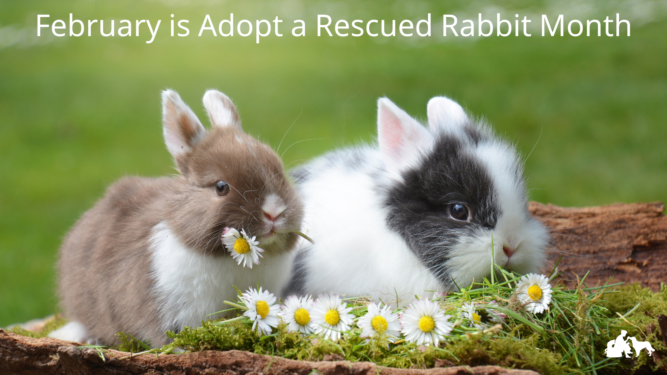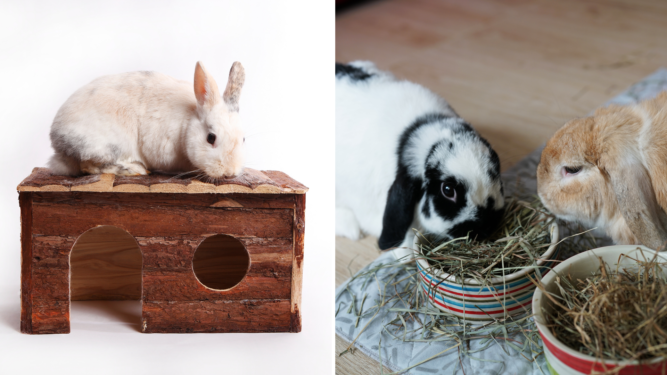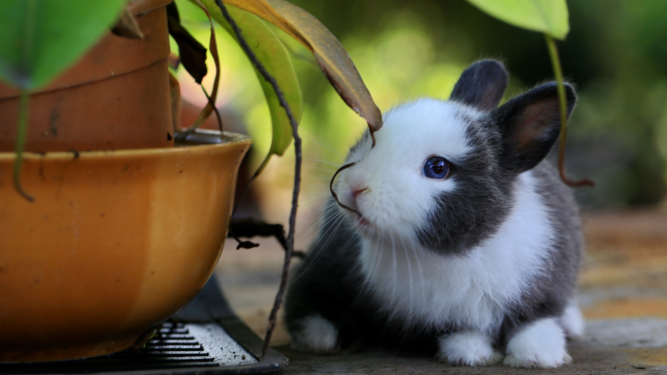Rabbit Care Tips - National Humane Education Society

Is your family looking for a furry companion? Are you considering adopting a rabbit? February is Adopt a Rescued Rabbit Month. We want to help raise awareness about rabbits and the care they need to live happy and healthy lives. With their wiggly noses, velvety fur, and quiet nature, they can be a wonderful addition to any family ready to give them the care they need. Sadly, as one study1 revealed, rabbits ended up in shelters and rescues because their owners got tired of them or were unable to care for them anymore. According to the Veterinary Medical Association, rabbits may live up to 15 years2, so educating yourself before bringing home an adorable one is important.

Do rabbits need to be spayed or neutered?
Yes, this necessary surgery will help improve a rabbit’s overall health, the same way it does with cats and dogs. It can also prevent uterine cancer and help diminish unwanted behaviors such as aggression and spraying.
What do rabbits need to eat?
Rabbits should primarily eat hay. Giving them hay to nibble on around the clock is crucial for their overall health and helps keep their teeth ground down. Some leafy greens, veggies, fruits, and pellets encompass a well-rounded diet. Treats should be given sparingly, and remember to provide fresh water daily.

What type of indoor space and enrichment do rabbits need?
Rabbits need a safe space that is large enough for them to stand up and hop around. Their space should consist of: a litter pan, toys for mental stimulation, food, water, and a place to sleep. Providing places to hide and appropriate toys to chew on and explore will help keep them from getting bored. Rabbit-proofing areas are essential to keeping them safe during their daily exercise sessions, so getting down on their level will give you the perspective needed to see what may catch their eye on their bunny adventures. Rabbits are social creatures, so please remember to provide lots of interaction time.
Is grooming necessary for rabbits?
Rabbits are meticulous groomers. Regular brushing sessions will help keep them from ingesting too much of their hair. Unlike cats who can vomit up their hairballs, rabbits do not have that capability. Rabbits also need to have their nails clipped to keep them from getting too sharp. Sometimes this can be a difficult job, so providing them with hard/rough surfaces to dig on will help keep them short.

What are some items toxic to rabbits?
Rabbits are naturally inquisitive. Electrical cords, grapes/raisins, and flowers, such as tulips, lilies, and daffodils, are just some of the items toxic to rabbits. Contact your veterinarian immediately if your rabbit is lethargic, refuses to eat or drink, or shows other signs of an illness.
For more information on caring for your rabbit, contact a local rabbit rescue group, ask a friend/family member who has a rabbit, read books or watch videos. The more you educate yourself about what your rabbit needs, the more you can enjoy your life with your furry friend!
Sources:
- Cook, A. J., & McCobb, E. (2012). Quantifying the shelter rabbit population: an analysis of Massachusetts and Rhode Island animal shelters. Journal of applied animal welfare science : JAAWS, 15(4), 297–312. https://doi.org/10.1080/10888705.2012.709084
- Selecting a pet rabbit. (n.d.). American Veterinary Medical Association. Retrieved February 18, 2022, from https://www.avma.org/resources/pet-owners/petcare/selecting-pet-rabbit









I have had pet rabbits since 1988! They are God’s most noble creatures! I’m currently on my 7th rabbit, a holland lop. I volunteer weekly at a rabbit rescue in Gig Harbor, WA. My rabbits have been one of the greatest joys of my life. People need to know more about rabbits before they adopt one. I always dread the Easter holiday and about 2 months after when many rabbits are surrendered or worse yet dumped.
I volunteer at an animal shelter and we have an unusual high amount of rabbits this year, some pure bred. I have found rabbits require more care than cats and are more fragile, not good for young kids.
All animals need to be spayed/neutered, vets are expensive and food and other items are not cheap.
People forget this and have to be reminded to prevent shelter surrenders.